Copyright ©2007 PopEntertainment.com. All rights reserved.
Posted:
December 7, 2007.
Playing the star-crossed lovers whose entire futures are blown apart by a
little girl’s unfair allegation in Atonement, British actors James
McAvoy (The Last King of Scotland, The Chronicles of Narnia) and
Keira Knightley (Pride and Prejudice, Pirates of the Caribbean)
radiate a palpable sense of lust and loss. Both are sure to be nominated
for many awards as the young, aloof heiress and the shy servant’s son who
find love and then have it ripped from them inexplicably – only to set them
adrift in separate tragic directions.
Possibly even stronger than the performances by these two are the women who
play the little sister whose false accusation destroys all three lives. The
character is played by three different actresses in a period covering
decades –
Saiorse Ronan
plays Briony as a little girl, Romola Garai takes the role as a young woman
and Vanessa Redgrave cameos as the character as an old woman.
Based on the beloved 2001 novel by Ian McEwan, the film of Atonement
reunites Knightley with her Pride and Prejudice director Joe Wright.
Sketching the life of three people over a decade – going from a
glamorous British country estate to the ravaged battlefields of World War II
– the film weaves an inspirational tapestry of beauty and sadness. The
movie floats effortlessly from the tranquil affluence of the early scenes to
the hellish battle scenes – including arguably the most expertly filmed
single scene in this year’s movies, a five minute-plus unbroken take
essaying the battleground at Dunkirk.
A
few days before the film was given a limited release – just in time to make
it a potential contender for the 2008 Academy Awards – film stars James
McAvoy and Keira Knightley sat down with us at the Regency Hotel in New York
to discuss the movie and their careers.
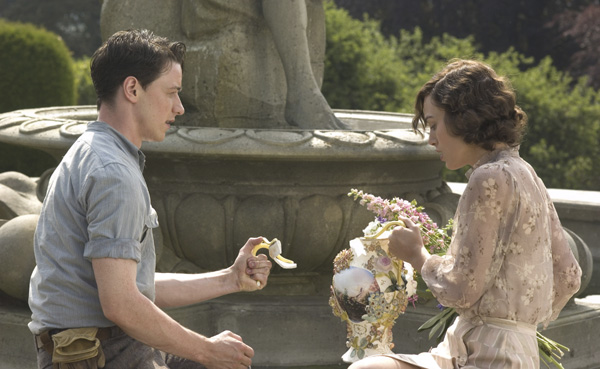 James,
what chemistry did you and Keira have? Was it hard?
James,
what chemistry did you and Keira have? Was it hard?
James McAvoy:
People always go
on about chemistry like it’s separate from acting and I don’t know that it
is. I don’t know that it is. I’ve watched some people acting who don’t
even like [each other] that have chemistry. I’ve seen people very much in
love with each other and it’s just fucking bad. And they are good actors,
as well.
Keira, could you
talk about the chemistry between you and James? He had his comments. Let’s
hear yours…
Keira Knightley:
(laughs) Well I know what his comments are. And I agree with it. I
should imagine that he said something along the lines of “it’s our job,
acting.” (laughs)
Sort of, yeah… He
did say more.
Keira Knightley:
And it is. I think it has a lot [to do with] it was a fantastic script, a
great director. We really got on. I think he’s a sensational actor.
Working with him was really, really exciting.
James McAvoy:
I don’t know. We
got on really well. We both were very serious about this film. We both
loved these characters. We quite quickly cottoned on in rehearsals that we
were on similar pages. We had similar views on what was going to work and
what wouldn’t. It felt like we both had an ally, really. We both had
someone backing each other up. Not that we needed it. It wasn’t like we
were in the face of some tyrannical director who we didn’t believe in. We
felt backed up by him, too. We just felt supported. Also, when you can
have a good laugh with somebody, you can communicate with somebody freely…
when you can do that, you can start having that thing… chemistry, I suppose.
Keira Knightley:
I think as far as chemistry goes, you can have the best actors together –
and in fact they can be in love with each other – and for some reason you
won’t have chemistry on the screen. I don’t think anyone ever knows what
makes that final bit of chemistry work. If they did then you’d make sure
you worked with people like that all the time. I think that obviously it
helped that we got on. Obviously the script is fantastic. So maybe that’s
the answer, but actually I don’t know.
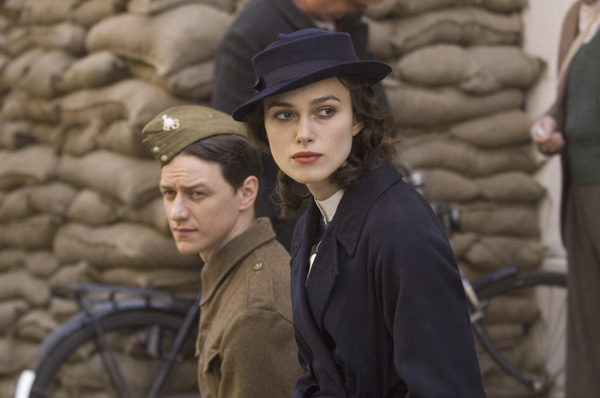 Was
there something about this role or book that really hit you or changed you?
Was
there something about this role or book that really hit you or changed you?
James McAvoy:
I don’t know if it’s changed me. The thing that hit me was – it’s a very
emotional piece, and yet it didn’t… I think… seek any sentiment. It engages
your intellect as much as it engages your heart. I can’t lie and say it
never totally blows your heart. I think if you’re willing to go there, and
you’re the kind of person who wants that, you can totally break down at any
point in the film that you like – especially towards the end. But I think
the film is constantly asking the audience to come back from the brink.
Just at the moment when it could have remained on a close-up of us going
(fakes sobbing), it cuts back to the stirring of the teaspoons,
which makes your brain click in a wee bit more. You go, “Oh, that’s
clever.” I think it could have become a big mush otherwise.
That appealed to me right from the beginning in the script. The script
itself treated actors like they had a modicum of intelligence. It didn’t
over-explain everything to us. It didn’t over-explain everything to the
audience either, in terms of dialogue. To find a film that was so epic and
sweeping and romantic and yet be intelligent was the best thing. Also the
fact that it’s a very classic story but it’s told in a very contemporary,
modern way. The techniques that the actors are imparting for the audience
are thoroughly modern. I liked that strange kind of setup. The structure’s
really fucked up. The structure is like… it’s three parts, and it’s all
different sections, and they’re very different visually. It’s just
obviously brilliant. People are going to sit down and in the first five
minutes they’re going to be thinking they’re watching a Merchant-Ivory
film. Then the word “cunt” is going to come in and get all the
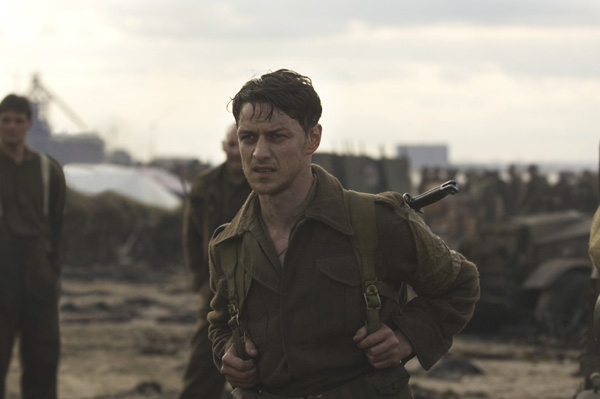 people
like (imitates) “Whoa! Where are we? We’re not watching a Merchant
Ivory film! Oh, my God!” I think that’s kind of brilliant.
people
like (imitates) “Whoa! Where are we? We’re not watching a Merchant
Ivory film! Oh, my God!” I think that’s kind of brilliant.
Tell us about
shooting the Dunkirk scene.
James McAvoy:
It was, hmm… pressurized. It was fraught. It was a massive gamble. Joe
really went out on a limb and thought, “Well, I can’t do what I want to do
with this scene, anyway,” he said. It had something to do with 40 setups
and he could only get fifteen, so he was like, “Let’s see.” And that’s fair
enough, actually. That’s played right on. So he said, “I can’t get what I
want to get. We can only have one day with these 1,000 extras and then we
lose them.” Because we had more money than most British films but we didn’t
have much money. So he had to go, “Fuck it, I’m going to be mad and really
gamble big time. You know, all in….” He asked us what we all thought. We
all went, “Hmm, not going to be easy.” But he had a crew and a cast who,
with his helming and his rustling and corralling and his ability to
galvanize people, he had a crew and a cast who made it happen. The great
thing is, I think, that filmmaking is a miracle of collaboration. That one
day was a microcosm of that experience. There were 1,800 people involved.
Any one of them could have screwed it up at any one time. We did three and
a half takes, so two and a half times one of those people did screw up at
any one time. The fact that we got a take when nobody screwed it up is
incredible. It’s testament to his audacity and his genius.”
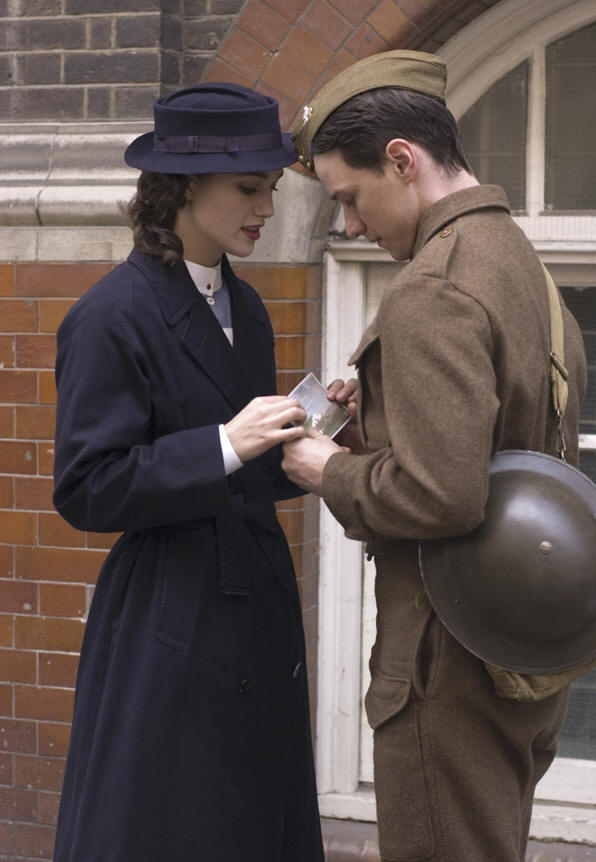 What
was the hardest scene for you to shoot, Keira?
What
was the hardest scene for you to shoot, Keira?
Keira Knightley:
I don’t know. We’ve been asked that a lot and I don’t know if hard is the
right word. I think every film is always challenging, and should be. But
because of this three weeks’ rehearsal we had, we were all so prepared. I
wouldn’t say that anything that stuck out in my mind as being particularly
difficult. The one that I loved doing, found challenging and really
exciting, was the Swallows teashop scene. That was actually one of my
favorites when I read the script. It’s partly because what they both want
to do is sort of pour out into this melodramatic… you know, they want to say
everything, but they can’t. So it was a really interesting process of
trying to think about all the things that wanted to be bursting out and then
repress that – which was actually what we were doing in the whole of the
film, really. Because it’s all about what’s not said as opposed to what is
said. But in that one it was fabulous to keep that balance between being
too melodramatic and too overemotional and keeping it in check.
Did you have
rehearsal time?
James McAvoy:
We had three weeks. Usually, you only get, like even a week, in British
films. It’s not necessarily well executed at all. I think film people
don’t always know what to do with rehearsal time. It’s just a time that
they can scrabble about and get people into costumes and figure out what
they’re going to do with their hair. But Joe grew up in the theater – grew
up in the public theater – so he knows. He appreciates just how valuable
that can be and what it can give you, if you’re willing to invest in it.
Also, he had three weeks, which we didn’t really need help. So, yeah, it
was great. We had a great time.
Keira, can you tell
us about this gorgeous, glamorous period? I’d like to know about the
research you went into to make Cecilia so elegant, glamorous, with the Bette
Davis poses. Did you look at those films going back?
Keira Knightley:
I did. It
wasn’t Bette Davis, though. Well, it’s always a bit of Bette Davis. It
was Greta Garbo quite a lot – with the smoking thing. Marlene Dietrich.
And Katherine Hepburn – because I always go back to Katherine Hepburn. I
love that quality that she’s got. But the real main inspiration for this
was Celia Johnson, from Brief Encounter. I watched it just on a loop
for about two months and actually would be very happy to watch it on a loop
forever. As a cast we all watched a lot of David Lean and Noel Coward and
those collaborations, which we served. And then Brief Encounter. We
watched a lot of news footage from that time as well. The accent is such a
specific thing and it’s completely lost to my generation – the British sort
of 1940s stiff upper lip. It was the height of
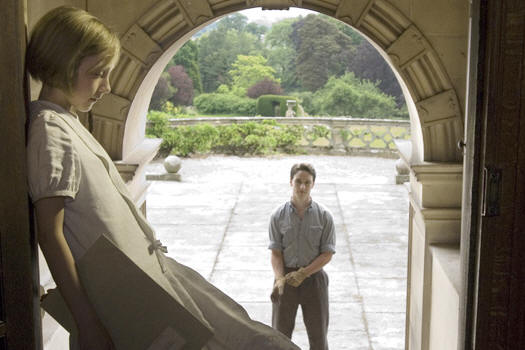 the
stiff upper lip, really. We all wanted to watch it together so that
everyone was on the same page. I think it wouldn’t have worked if one
person hadn’t done it. We did a lot of research into the accent and finding
exactly what we wanted and what part of it we didn’t.
the
stiff upper lip, really. We all wanted to watch it together so that
everyone was on the same page. I think it wouldn’t have worked if one
person hadn’t done it. We did a lot of research into the accent and finding
exactly what we wanted and what part of it we didn’t.
Can you tell us about
working with Saiorse Ronan?
James McAvoy:
She’s brilliant in the film. I’ll tell you what it is. When you’re looking
for a kid you just look for somebody that can act. You just look for
somebody who can be natural. You go this is the script, and they’re going
to do whatever the fuck they’re going to do. But I don’t care as the
filmmaker, because they’re incredible and they can be truthful, which is the
hardest thing to find. So let you what you need to do, and all the other
actors fit in. Make it work somehow. What’s incredible about Saiorse is –
she’s not like
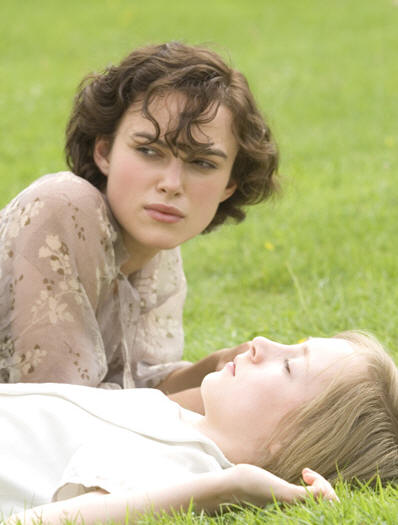 that.
She was twelve years old when she made this film. I think. She lambasted
me in a Q&A for getting her age wrong. She was a twelve year old when we
made this film and she can imagine what it is. It’s not life experience
that she’s
drawing upon, but she can imagine what it is to be someone else. Not just
being her being natural in front of a camera. I think that’s what’s
remarkable about her. I’ve been really lucky – I’ve worked with a lot of
brilliant kids in my career. It’s something that I hope I get to do a lot,
because it means I can have a lot of fun that I wouldn’t necessarily have.
It was a great privilege being with Saiorse.
that.
She was twelve years old when she made this film. I think. She lambasted
me in a Q&A for getting her age wrong. She was a twelve year old when we
made this film and she can imagine what it is. It’s not life experience
that she’s
drawing upon, but she can imagine what it is to be someone else. Not just
being her being natural in front of a camera. I think that’s what’s
remarkable about her. I’ve been really lucky – I’ve worked with a lot of
brilliant kids in my career. It’s something that I hope I get to do a lot,
because it means I can have a lot of fun that I wouldn’t necessarily have.
It was a great privilege being with Saiorse.
Keira Knightley:
She’s
amazing. She is twelve and she’s got this thick Irish accent. [Then] she
comes out and she’s got this pitch perfect 1940’s British accent. I think
what’s incredible with Saiorse [is] that’s not taught. That’s not taught.
So where does that talent come from? It’s just… it is extraordinary.
People keep on saying ‘What advice are you giving her?’ I would never dream
of giving Saiorse Ronan advice. I’ll take advice from her, but I certainly
won’t give it.
The scene in the
kitchen, where Briony comes to apologize to Cecilia and
Robbie is there – it seems like your
character is right on the verge of exploding with rage.
James McAvoy:
Yeah.
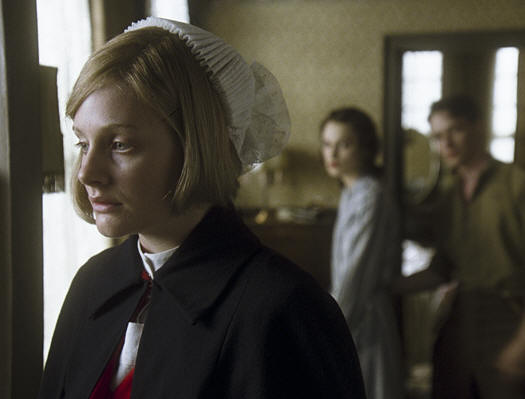 Did
you do the scene different ways? Was there a scene where you exploded or
one where you held back even more?
Did
you do the scene different ways? Was there a scene where you exploded or
one where you held back even more?
James McAvoy:
No. I think we always knew this step is so brilliant. So brilliantly
drawn. From a great novel and Christopher Hampton did such a great job of
throwing the characters in and out and about – that I think we always knew
where we wanted to pitch it. Yeah, maybe we tried to go a little bit more.
Then we tried to go a little bit less. But, I mean, really, it’s like that
(gestures with his hand to show close) because, we knew what we had
to do. We knew we wanted to do it. That scene and the scene in the tearoom
when they see each other for the first time in six years after he’s come
back from prison, were the two scenes that really made me feel like I could
do the script and made me want to do the script, to do the film. He is
ready to explode. He is ready to kill her. I wish he had killed her. I
find it really hard to forgive her. (laughs)
Robbie isn’t bitter
– which is rather remarkable.
James McAvoy:
No, of course
not. Well, he’s kind of been patronized I suppose, his entire life. But I
think that’s what makes Robbie such an amazing person. It’s what makes him
worryingly inhuman – not necessarily representative of the human race.
There’s no darkness. I think he has empathy for everyone. I think he gets
Mrs. Tallis. He understands why she doesn’t like him. Why he challenges
her. Why she challenges her entire system. But, what is he going to do?
Why should he be angry that she’s upset? She’s the one with the problem.
All he’s done is have an amazing fucking life. (chuckles) The thing
that you don’t get in the film is the relationshio he has with their
father. He’s got a closer relationship with the father than any of them
do. He’s the son that the other son should have been. I think he takes a
lot of strength out of that relationship. He’s not bitter, that’s the
amazing thing. He becomes somebody who gets bitter. He becomes somebody
who is tainted, and strangely becomes much more identifiably human. When he
becomes suicidal – being suicidal seems to be a more human trait than
forgiveness and empathy and chilled-out-ness and openness. You know what I
mean? It seems to be.
Was it kind of hard
getting into Cecilia’s mindset? Early on in the film she was kind of icy.
Keira Knightley:
I never saw her like that. I mean, yes – yes, she is. But I never saw her
like that. I always completely understood it. I think that’s why I fell in
love with her from the moment I read the script. It was because I saw her
so clearly. I think that very often in film you have characters that are
black or white. What’s fascinating about her is she’s probably a very good
person, but she’s behaving like a bitch. I think we all do. I think you
very rarely see that. I just love the different layers of her. I think the
fact that in the book it completely describes how she’s feeling. It
describes that long, hot, sticky day that’s completely airless. And that
need for a cigarette that’s making her even more on edge. I found her
totally fascinating.
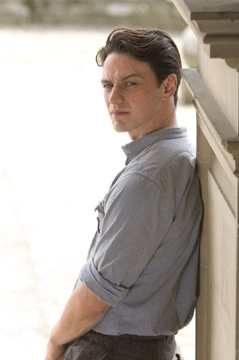 There’s
a scene that’s pivotal for your character and it’s really quiet – the scene
where James is talking to his mother – the scene with Brenda Blethyn before
the dinner party. Do you feel that scene was about class-consciousness?
There’s
a scene that’s pivotal for your character and it’s really quiet – the scene
where James is talking to his mother – the scene with Brenda Blethyn before
the dinner party. Do you feel that scene was about class-consciousness?
James McAvoy:
We spent a long time, Brenda and I. Brenda is one of my favorite
actresses. She is just wonderful. I was very honored just to spend time
with her. I think she’s a quite special lady as well as a good actor. We
spent quite a long time talking about our relationship, as characters
sometimes talking to each other in rehearsals. There was a whole beautiful
story that we had that was created in the absence of dialogue. There’s real
love between those two. I think they admire each other, and that admiration
knows no bounds. I think they’re kind of in love with each other. They
don’t just love each other; I think they’re in love with each other a little
bit. That’s not necessarily what that scene’s about or what it explores,
but that’s why it so full I think. There’s that thing – your mother can’t
help but be proud, and yet be terrified as well. Yeah. I loved doing that
scene. I don’t know what it’s about, but it’s very full. It felt full.
Did it help having
worked with [director] Joe [Wright] before?
Keira Knightley:
Yeah. I love working with Joe. I loved him the moment I met him. For some
reason – I think chemistry between actors is very rare, and I think
chemistry between actor and director is even more rare. We have really good
creative chemistry for some reason. I don’t know why. We speak the same
language. I think very often… you know, acting is all about emotions.
Everybody intrinsically has the same emotions, but we describe them
differently. Sometimes on the set, that can feel literally like a language
barrier. With Joe… we describe emotions the same, so we kind of had our own
language. We just hoped we understood, that I understood what he wanted,
which is always helpful.
I read that Joe said
that he wanted the acting in the film to be reminiscent of films from the
1930s and 40s. As an actor trained in more modern techniques, was that a
challenge?
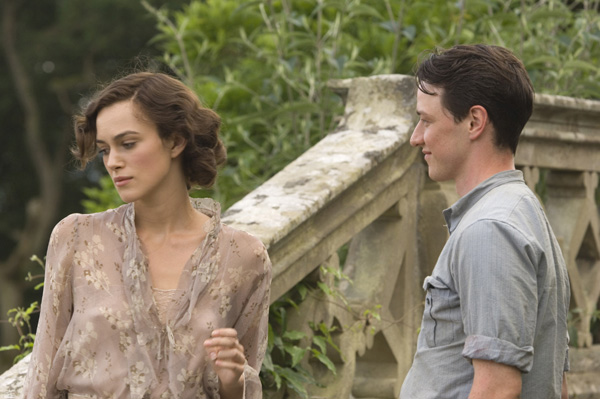 James
McAvoy: It
was a joy to do that. I have a theater training and I’ve done a lot of work
in theater. I had a classic training in a conservatory in Glasgow. Things
that I’ve learned are probably about a thousand miles away from things that
they’ve learned, you know? During their film training and everything. So,
that was a bit of a joy. Playing with styles is something that I try and do
in every film. I don’t think an actor should go into every film with one
technique. I think you should become the type of actor that’s required for
the style of the film or the thing that you’re doing. So that requires you
to change. This was just an extension of that. It wasn’t the easiest thing
that I’ve done, in saying that. I think it was easier for some of the cast
than others. Some of the cast are quite [comfortable]. Some of us aren’t.
Saiorse, me and a few others… it just took a few weeks longer to get our
heads in, you know? That was just it. Generally, what I loved was that we
did it together. We sat around a table with this many people at it (he
gestures to the table with about a dozen writers around him) and we
wouldn’t just go away home and do out work on our accent. We would do it
together, so that the style of acting had a cohesive bond that made us feel
like the film had a style instead of each actor standing out with different
things.
James
McAvoy: It
was a joy to do that. I have a theater training and I’ve done a lot of work
in theater. I had a classic training in a conservatory in Glasgow. Things
that I’ve learned are probably about a thousand miles away from things that
they’ve learned, you know? During their film training and everything. So,
that was a bit of a joy. Playing with styles is something that I try and do
in every film. I don’t think an actor should go into every film with one
technique. I think you should become the type of actor that’s required for
the style of the film or the thing that you’re doing. So that requires you
to change. This was just an extension of that. It wasn’t the easiest thing
that I’ve done, in saying that. I think it was easier for some of the cast
than others. Some of the cast are quite [comfortable]. Some of us aren’t.
Saiorse, me and a few others… it just took a few weeks longer to get our
heads in, you know? That was just it. Generally, what I loved was that we
did it together. We sat around a table with this many people at it (he
gestures to the table with about a dozen writers around him) and we
wouldn’t just go away home and do out work on our accent. We would do it
together, so that the style of acting had a cohesive bond that made us feel
like the film had a style instead of each actor standing out with different
things.
But it was an absolute joy. It wouldn’t work with every script. It was a
particular script. It can work with contemporary things as well. The style
– not just with the accent, not just the speech. The things like talking on
voice the entire time. Like now, never whisper, unless you’re dying or
you’re trying to be stealthy. Never let your energy drop at the end of a
line. It’s very theatrical, you know, but only people would do that in film
and then it would work. It was an artistic trait at the time, but it was
also a social trait at the time – this lack of ability to express. Keep
things bottled up and don’t let them out. So when you come to drama and you
have that social constraint, you have a great potential – because things
always come out in drama, even in that period. However, when they do come
out, they fucking explode. That’s dead exciting. That defines everything.
I love that. I really love that. Quite often it’s hard too… in real life
these days you go “I quite like her,” and in a couple of days you’re holding
hands. God knows what else you’re doing. Then, it was just so different.
It’s just so wonderful, the things that can’t be said.
Keira, you seem to
like things from historical periods and the chance to wear costumes. Is
there some fascination with history?
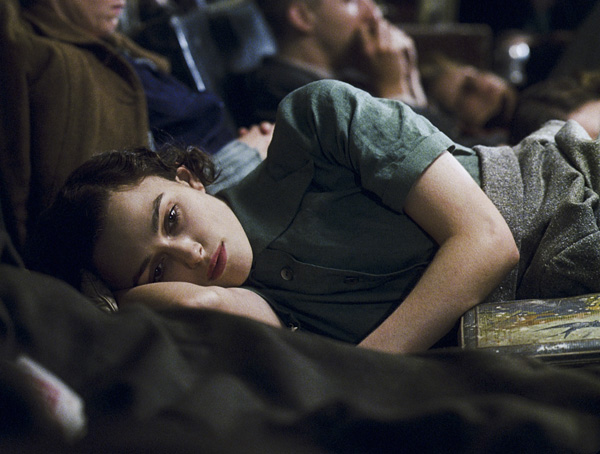 Keira
Knightley:
I’ve always liked history. I’ve always been fascinated by it. It’s not
particularly that I’m going I want to do things that are historical. It’s
simply been the stories that have interested me. You know if I find a
contemporary story that interests me I’ll certainly do that as well. For
some reason or another, the female parts… there are always much fewer good
roles for actresses than there are for actors. Most of them that I’ve read
indeed have simply been period pieces as opposed to contemporary pieces. It
goes in swings. It will come; there will be a point when stuff that is
interesting is contemporary, as well. But, I haven’t so far. (laughs)
Keira
Knightley:
I’ve always liked history. I’ve always been fascinated by it. It’s not
particularly that I’m going I want to do things that are historical. It’s
simply been the stories that have interested me. You know if I find a
contemporary story that interests me I’ll certainly do that as well. For
some reason or another, the female parts… there are always much fewer good
roles for actresses than there are for actors. Most of them that I’ve read
indeed have simply been period pieces as opposed to contemporary pieces. It
goes in swings. It will come; there will be a point when stuff that is
interesting is contemporary, as well. But, I haven’t so far. (laughs)
You’ve had good luck
with movies based on books. Is there an advantage in reading the books?
James McAvoy:
You do. I mean; it depends. If you’re making something that is incredibly
faithful to the original, then yes, it is an advantage. If you’re… like
Last King of Scotland was faithful in its essence, but my character was
such a departure from Nicholas Garrigan in Giles Foden’s book that it wasn’t
helpful to read the book. It got in the way. I had to try and forget it,
because it was so different. But in this it was incredibly helpful. It’s
an amazing source. I read from it nearly every day.
Do you like doing
films based on books, or does it matter?
James McAvoy:
You know; it doesn’t matter. A good script is a good script. But if it’s
based on a book and it’s faithful to the book, then it would be ridiculous
not to use the book. But if it’s based on a book and it’s not faithful
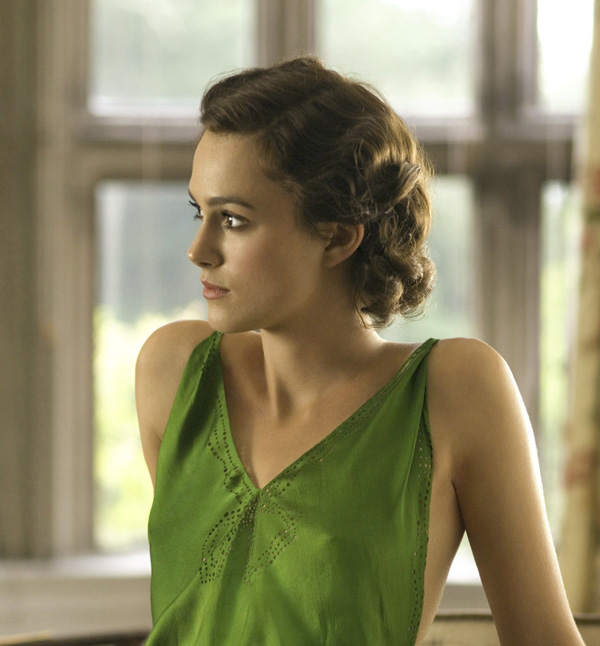 to
the book, then you’ve got to make a decision whether you back off or have
that conflict with the director and the
filmmakers where you
say “Well, in the book, you see, there’s this.” They’re like “Well in the
fucking script it doesn’t, so fucking shut up.”
to
the book, then you’ve got to make a decision whether you back off or have
that conflict with the director and the
filmmakers where you
say “Well, in the book, you see, there’s this.” They’re like “Well in the
fucking script it doesn’t, so fucking shut up.”
Did you read the book
of
Atonement before you did the movie?
Keira Knightley:
I read the book, yes. I read the script first, but then I read the book as
soon as had said yes to it. It was a fantastic blueprint.
Did you talk to Ian
[McEwan] about it?
Keira Knightley:
Yeah. Well, no – not before. He actually came on
set a couple of times. He was very nice. Then at the London premiere he
came up to me and said ‘It’s interesting. It works so well, but you played
it so differently than I’d written it.’ And I thought, no I didn’t, I
played it exactly… It’s really funny. I think that’s what’s wonderful
about the characters, people have such different ways of seeing them. I
obviously saw it differently than Ian McEwan saw it.
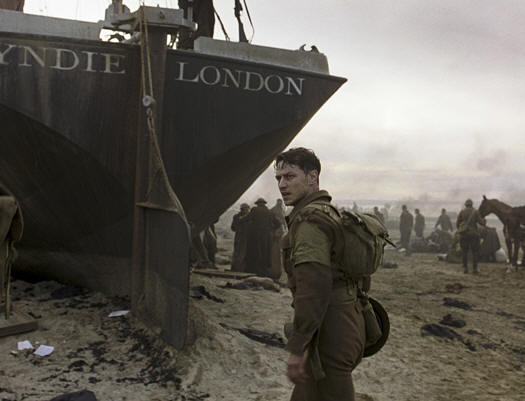 Going
back to the Dunkirk sequence, how do you stay an actor amongst all the
choreography and other things going on around you in such a long take?
Going
back to the Dunkirk sequence, how do you stay an actor amongst all the
choreography and other things going on around you in such a long take?
James McAvoy:
In a weird way that is an actor. I never let go of that really. If you do,
you mess up everybody’s day. The question is – or the question for me was –
how do I maintain connection with all the technical marks I need to hit.
Not just in terms of physically, but in terms of levels acting-wise, while
still feeling the emotion of that moment. You start to get overwhelmed with
emotion. It’s an incredibly moving day. Recreating something like that is
not something that happens a lot. To do it so well, so effectively, so
massively doesn’t happen a lot. Also, you’ve got pressure riding on it, so
it amplifies the emotion. You start to get a bit overwhelmed. Then you
realize that’s you commenting on it. It’s not you living it. It’s not
probably the way that every soldier felt. And it’s not necessarily the way
that this soldier should feel. So you have to detach yourself quite a bit,
otherwise the actor just goes “This is so big, and scary and horrible” –
which of course it is, but that should be the reaction of the person
watching it. Indeed, I let myself feel like that when I watched it two days
later and the rest of the crew did as well. We were all together. I
suppose – not to say that this job is in anyway like soldiers’ jobs, because
they’re not – but there’s a detachment that you have to try and achieve, I
think. Otherwise a logistical nightmare of a scene like that would fail
because actors wanted to feel it too much.
What are some of
your favorite films this year?
Keira Knightley:
Of this year? I just saw Michael Clayton, which I thought was
wonderful. Tilda Swinton in that was unbelievable. All the performances
were great. I really loved Into the Wild. I thought that was a very
inspirational film. Actually, the DOP [director of photography] for that
one, who also did A Guide To Recognizing Your Saints, is one of my
favorite. I thought that film, as a first-time writer/director, I thought
that was wonderful. Chazz Palmenteri, the guy that plays the dad… oh my
God, that scene with him and Shia LaBoeuf in the bath – just amazing.
Marion Cotillard in La Vie en Rose. I think that is one of the most
extraordinary performances I’ve ever seen.
And from the period of
the film?
Keira Knightley:
Casablanca. That’s just one that’s got to be. All About Eve.
(laughs) Again, For Which We Serve and my favorite has to be
Brief Encounter. Is it Rachmaninoff that they play? What is it they
play? It’s not Rachmaninoff, it’s something else. There is a piece of
music – the only piece of music that they play all the way through – and
it’s just brilliant. There are lots of films that I like. (laughs)
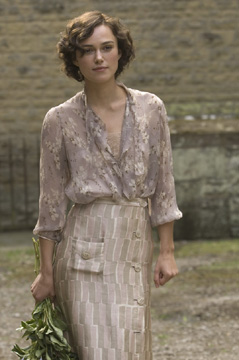 You
talk about female leads. You have played some of the greatest female
characters – you have power and you get to be a pirate – Elizabeth Bennett
is an icon. How do you get away with that?
You
talk about female leads. You have played some of the greatest female
characters – you have power and you get to be a pirate – Elizabeth Bennett
is an icon. How do you get away with that?
Keira Knightley:
I’ve been
very lucky. I was very lucky with a lot of them… that they just happened to
be the ones that I got. I was auditioning for lots of different roles and
they were the ones that they offered me. So, I have no answer for that.
Do you think it’s an
important thing to do though; you can stick up for people?
Keira Knightley:
I think as
a woman what I’m interested in is seeing interesting female roles onscreen.
I’m not interested really in seeing women that are very much the secondary,
token woman… which there always are, and that’s fair enough. But as far as
being a cinemagoer I’m excited when I see female roles that have a bit of
different layers to them. That can be something inspiring. I think that’s
important.
What other films are
you working on or do you have coming?
Keira Knightley:
I’ve just finished one called The Duchess, which is based on part of
the life of the Duchess of Devonshire, who was a political hostess in the
1780s. I’ve just done that with Ralph Fiennes and Charlotte Rampling.
Before that I was working on a film that my mum’s written about Dylan Thomas
and a group of friends that surrounded him – and an act of violence that
happened and the circumstances that led to the act of violence. That was
with Cillian Murphy, Sienna Miller and Matthew Rhys.
What about you,
James?
James McAvoy:
I’m not working on any at the moment. I’ve got a thing coming out called
Penelope in February, with Reese Witherspoon and Christina Ricci.
Then in March is a thing called Wanted, which is an action/adventure
film, with Morgan Freeman and Angelina Jolie. That’s March. After that…
I’ve got things that we’re about to sign off on, but should they not happen
and fall apart in the last minute, I shouldn’t really talk about them.
Keira,
part 3 of
Pirates of the Caribbean
comes out on DVD today. I know that
Pirates
was planned out as a trilogy, but they left it open for the possibility of
more. Can you see going back to that?
Keira Knightley:
I can’t
imagine doing another one. That was an amazing experience. It really was.
Totally extraordinary. But no, I think three for me is probably enough.
(laughs)
CLICK HERE TO SEE WHAT KEIRA KNIGHTLEY HAD TO
SAY TO US IN 2006!
CLICK HERE TO SEE WHAT KEIRA KNIGHTLEY HAD
TO SAY TO US IN 2012!
CLICK HERE TO SEE
WHAT JAMES McAVOY HAD TO SAY TO US IN 2015!
Email
us Let us know what you
think.
Features
Return to the features page.